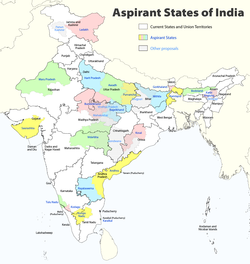Rayalaseema
Rayalaseema (Rāyalasīma) is a geographic region in the Indian state of Andhra Pradesh. It comprises four southern districts of the state namely, Anantapur, Chittoor, YSR Kadapa and Kurnool.[2][3] As of 2011 census of India, the region with four districts had a population of 15,184,908 and covers an area of 67,526 km2 (26,072 sq mi).[4] Anantapur is largest among other districts.
Rayalaseema Ceded, Dathamandalam | |
|---|---|
Region of Andhra Pradesh | |
Telugu Talli Staue with Kondareddy Buruju in Kurnool City | |
| Nickname(s): Cultural Region of Andhra Pradesh | |
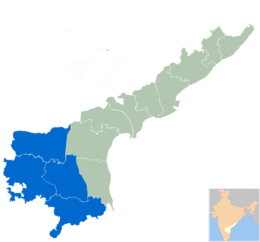 Rayalaseema in Andhra Pradesh | |
| Country | |
| State | Andhra Pradesh |
| District(s) | |
| Largest Cities | |
| Founded by | Chilakuri Narayan Rao |
| Named for | Rayal Dynasty |
| Government | |
| • Type | Democratic |
| • Body | Bicameral |
| Area | |
| • Total | 67,526 km2 (26,072 sq mi) |
| Population (2011) | |
| • Total | 15,184,908 |
| • Density | 226/km2 (590/sq mi) |
| Languages | |
| • Official | Telugu, Urdu |
| • Regional | Tamil |
| Time zone | UTC+05:30 (IST) |
| Vehicle registration | AP02, AP03, AP04, AP21, AP39 |
| Largest Airport | Tirupati International Airport |

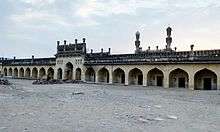
Etymology
The present-day region of Rayalaseema in Andhra Pradesh was officially referred to as the 'Ceded Districts' ('Datta Maṇḍalālu' in Telugu) under the British Madras Presidency, since the districts had been ceded by the Nizam of Hyderabad to the British.
The local intellectuals found the name 'Datta Maṇḍalālu' to be insulting. In 1928,a strong dislike was expressed from the leaders in the Andhra Mahasabha, held at Nandyal and they sought to rename it.
The region got its name as Rayalaseema with a proposal from Chilukuri Narayana Rao and was accepted.[5] The name Rayalaseema hearkened back to the Vijayanagara times, whose Kings used a suffix Rāya (tadbhava of Sanskrit Rājan) or Rāyalu in Telugu as their title.
Thus, Rāyalasīma means 'the region or extent of Rāyala rule'. 'Rāyala' could also refer to Kr̥ṣṇarāya in particular.
History
During the British era, the Nizam of Hyderabad ceded this area to the British, and hence was called Ceded Districts. Upon Independence, it was renamed as Rayalaseema as 'seema' was an administrative territorial entity of the Vijayanagara Empire similar to today's districts.
Post independence
The four districts of the region were part of the Madras Presidency until 1953.[6] From 1953–1956, the region was a part of Andhra State and in 1956, the Telangana region was merged with Andhra State to form Andhra Pradesh State.[7] On 2 February 1970, three taluks from Kurnool i.e., Markapur, Cumbum and Giddalur were merged along with some other taluks of Nellore district and Guntur district to form Prakasam district.
In February 2014, the Andhra Pradesh Reorganisation Act, 2014 bill was passed by the Parliament of India for the formation of Telangana state comprising ten districts. Hyderabad will remain as a joint capital for 10 years for both Andhra Pradesh and Telangana.[8] The new state of Telangana came into existence on 2 June 2014 after approval from the President of India.[9] The formation of a new state named Telangana from Andhra Pradesh is not considered an amendment to the Constitution of India per article 3 and 4 of that document.[10]
Geography
Rayalaseema region is located in the southern region of the state of Andhra Pradesh. The region borders the state of Tamil Nadu to the south, Karnataka to the west and Telangana to the north.[11]
Economy
Rayalaseema is rich in minerals – asbestos, barite, china clay, calcite, dolomite, diamonds, green quartz, iron ore, limestone and silica sand. It also has rich forest wealth like the rare Red sandalwood. The Rayalaseema area is prone to drought. The Bangalore–Chennai industrial corridor runs through Ananthapur and Chittoor districts with Chittoor, Hindupur-Penukonda, Madanapalle,Tirupati, Sricity being major industrial attractions.[12]
Literature
Telugu culture reached its zenith during the Vijayanagara rule under Sri Krishnadevaraya. Amongst Ashta Diggajas, Allasani Peddana, Dhoorjati, Nandi Timmana, Maadayyagari Mallana and Ayyalaraju Rama Bhadrudu are from this region. Poets like Vemana, Sri Potuluri Virabrahmendra Swami from YSR Kadapa district played a great role in educating the common people through their literary works. It is also written by most experts (per Kandukuri Viresalingam etc.) until the 1930s that Pothana, who penned Andhra Mahabhagavatham, actually belonged to Ontimitta village of YSR Kadapa District . Indian philosopher and spiritual teacher Jiddu Krishnamurti and Cattamanchi Ramalinga Reddy – an essayist, poet and educationist are from this region. Yogi Vemana is also a notable poet. Annamayya is from YSR Kadapa District who got settled in Tirupati of Chittor District and composed many songs in praise of Sri Venkateshwara Swamy is of Vijayanagara period and is one of the most famous Carnatic composer in the history of Telugu Literature.
Music and actors
There are many notable actors in film industry such as, Chitturu Nagayya, Kadiri Venkata Reddy, Pasupuleti Kannamba, Basavaraju Venkata Padmanabha Rao, Chadalavada Kutumba Rao, Mohan Babu etc. Musicians and poets include, Annamayya, Rallapalli Anantha Krishna Sharma, Vellaala Subbamma etc.
Annamayya is a spiritual guru, who wrote songs on Lord Venkateswara, Sri Potuluri Virabrahmendra Swami, Ganapathi Sachchidananda, Satya Sai baba is a spiritual and religious savant, Jiddu Krishnamurtie.
Landmarks

Gandikota is one of the oldest fort dating back to 1123 near proddatur. Belum Caves are the second largest cave in Indian sub-continent and the longest caves in plains of Indian Subcontinent. It is located at Belum Village of Kurnool District. Sri Lankamalleswara Wildlife Sanctuary is the only Sanctuary in the world which provides home for a bird called Jerdon's courser. Gurramkonda, Chandragiri, Horsley Hills, Kuppam and Talakona of Chittoor district.
Thimmama Marrimanu, world's largest banyan tree, covering 5.2 acres (21,000 m2) and 550 years old. It holds a Guinness record. It is situated Near Kadiri, 120 kilometres from Anantapur.

Religious destinations
Rayalaseema has many important places of pilgrimage. Tirumala Venkateswara Temple, abode of Lord Venkateswara is one of the richest and the most visited place of worship in the world. The other being Srisailam, Ahobilam, Srikalahasti, Kanipakam, Kadiri, Rayadurgam, Penna Ahobilam, Mahanandi, Mantralayam, Proddatur, Puttaparthi, Yaganti, Lepakshi, Ontimitta, Bramhamgarimatham, Pushpagiri etc. Shahi Jamia Masjid in Adoni is one of the oldest constructions in South India, built around 1662 AD by Siddi Masood Khan,[13] Ameen Peer Dargah, a famous Sufi Shrine in India.
Education
Rayalaseema Region has good number of universities, medical colleges, central premiere institutions and deemed universities.
Universities
- Sri Venkateswara University
- Sri Krishna Devaraya University
- Yogi Vemana University
- Rayalaseema University
- Dr. Abdul Haq Urdu University
- Dravidian University
- Sri Padmavati Mahila Visvavidyalayam
- JNTU Anantapur
- Rajiv Gandhi University of Knowledge Technologies, Idupulapaya.
Medical colleges
- Sri Venkateswara Institute of Medical Sciences,Tirupathi
- Rajiv Gandhi Institute of Medical Sciences, Kadapa
- Kurnool Medical College
- Government Medical College, Anantapur
- Sri Venkateswara Medical College, Tirupathi
- Sri padmavathi medical college,Tirupathi
Central institutions
- Indian Institute of Technology, Tirupati
- Indian Institute of Science Education and Research, Tirupati
- Indian Institute of Information Technology Design and Manufacturing, Kurnool
- Indian Institute of Information Technology, Sri City
Deemed universities
- Sri Sathya Sai University
- Rashtriya Sanskrit Vidyapeeth.
Infrastructure
Rayalaseema Region is well connected by roads, railways, and airports. Being located away from sea this region doesn't contain sea port.
Roadways
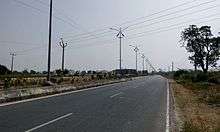
The road network in region consists of many National Highways such as, NH 40, NH 42, NH 44, NH 140, NH 167, NH 340, NH 67, NH 69, NH 71, NH 716.
Railways
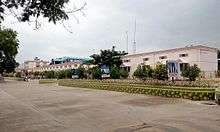
The rail connectivity is getting better with the projects allocated or being part of the region such as, Nandyal-Yerraguntla, Nadikudi–Srikalahasti, Kadapa-Bangalore sections are the under development projects which forms a part of the region.[14] Most of the region falls under the jurisdiction of Guntakal railway division of South Central Railway zone.
Airports
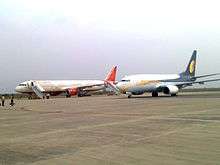
Rayalaseema region has air connectivity with four airports Tirupati International Airport, Sri Sathya Sai Airport, Kadapa Airport and Kurnool Airport.
Power

Rayalaseema Region has Thermal as well solar power plants. Rayalaseema Thermal Power Station is located in Kadapa district and Andhra Pradesh government recently sanctioned solar power parks in Rayalaseema districts[15] with a capacity of 4000MW's.Today the state of Andhra Pradesh stood No.1 position in solar power generation with an installed capacity of 1868 MW[16] In India and also offers world's largest solar power park of 1000 MW is also located in Andhra Pradesh.
Cities and Towns
Major cities of this region are Kurnool, Kadapa, Tirupati and Anantapur.Other major towns in the region include Proddatur, Nandyal, Adoni, Madanapalle, Chittoor, Hindupur, Dharmavaram and Tadipatri.
Politics
Neelam Sanjiva Reddy, Damodaram Sanjivayya, Kotla Vijaya Bhaskara Reddy, N. Chandrababu Naidu, Y. S. Rajasekhara Reddy, N.Kiran Kumar Reddy and Y. S. Jagan Mohan Reddy are the people who served as Chief Minister of Andhra Pradesh, hail from the Rayalaseema region of the state, with Y. S. Jagan Mohan Reddy being the incumbent. The region saw as many as 7 chief ministers for the state.[17]
Sri Baghpact
Based on Sri Bagh Pact signed on 18 November 1937, Kurnool was made as the capital of the new state after the division of Andhra state from the Madras state.[18][19] As per the second State Resolution Commission, capital was shifted to Hyderabad upon the formation of Andhra Pradesh.[20]
See also
References
- "Andhra Pradesh Fact Sheet". mapsofindia.com.
- Jammanna, Akepogu; Sudhakar, Pasala (2016). Dalits' Struggle for Social Justice in Andhra Pradesh (1956–2008): From Relays to Vacuum Tubes. Cambridge Scholars Publishing. p. 156. ISBN 978-1-4438-4496-3. Retrieved 12 July 2017.
- Rajeev, M (11 October 2015). "Rayalaseema in a state of discontent". The Hindu. Archived from the original on 8 December 2015. Retrieved 8 December 2015.
- "Population of AP districts(2011)" (PDF). ap.gov.in. p. 14. Archived from the original (PDF) on 12 November 2013. Retrieved 25 May 2014.
- Correspondent, Special. "The birth of Rayalaseema". The Hindu. Retrieved 12 June 2017.
- "The Indian Express – Google News Archive Search". google.com.
- "The Indian Express – Google News Archive Search". google.com.
- "The Andhra Pradesh Reorganisation Act, 2014" (PDF). India Code Legislative Department. Ministry of Law and Justice. 1 March 2014. p. 2. Retrieved 14 July 2015.
- "Telangana state formation gazette". The New Indian Express. Retrieved 14 May 2014.
- "Constitution of India Sub-section". Indiankanoon.org. 4 March 2014. Retrieved 23 April 2014.
- "Andhra Pradesh – end of an era". Business Standard. Hyderabad. 30 July 2013. Retrieved 8 April 2016.
- Rajeev, M. "Rayalaseema in a state of discontent". Thehindu.com.
- "Archived copy". Archived from the original on 14 March 2011. Retrieved 2 April 2011.CS1 maint: archived copy as title (link)
- "Proper rail connectivity still a far cry in Rayalaseema". The Hindu. Retrieved 26 May 2017.
- "AP Solar Corpn sanctions 4,000 MW power parks". M.thehindubusinessline.com. 22 December 2015.
- Raghavendra, V. (29 April 2017). "With Kurnool solar park, State takes a giant leap". Thehindu.com. Retrieved 16 February 2019.
- "Telangana.com – Committed For Development". Telangana.com.
- Raju, P. Yenadi (2003). Rayalaseema during colonial times : a study un indian nationalism. New Dehli: Northern Book Centre. p. 214. ISBN 978-81-7211-139-7. Retrieved 3 September 2015.
- "APonline – History and Culture – History-Post-Independence Era". aponline.gov.in. Archived from the original on 20 December 2013.
- "Revive Sri Bagh pact, demands vedika". Hyderabad. 19 June 2014. Retrieved 3 September 2015.
Further reading
- Reddy, G. Samba Siva (2006–2007). "Making of Micro-Regional Identities in the Colonial Context: Studying the Rayalaseema Maha Sabha, 1934–1956". Proceedings of the Indian History Congress. 67: 500–513. JSTOR 44147969.CS1 maint: date format (link)
![]()
